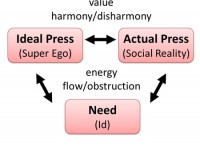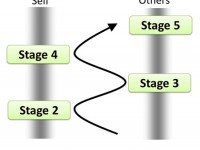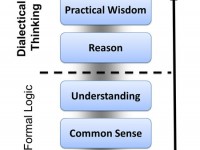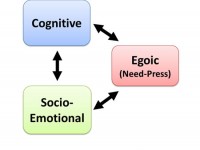In CDF, a person’s psychological profile is determined by evaluating answers to Morris Aderman’s Need/Press Questionnaire, a construct-validated questionnaire used in talent management, performance management, and promotion since 1970. The questionnaire is available on line in English, German, French, and Spanish (www.needpress.com). Questionnaire outcomes ideally complement social-emotional insight deriving from semi-structured interviews. The questionnaire embodies Henry Murray’s personality theory which is based on the notion of psychogenic (inborn) needs and associated pressures as defining a individual’s personality. In NP, clients’ profile is viewed in terms of three foci: self concept, approach to tasks, and interpersonal perspective (emotional intelligence.). Discussing these behavioural clusters in class tremendously helps students distinguish between what is “social-emotional” (developmental) and “psychological” in their own and in clients’ behavior and way of working with others. Students learn to make fine behavioral distinctions and observations; they also learn how to give appropriate and complex feedback to clients, weaving psychological insights into feedback on clients’ present social-emotional frame of reference. In CDF, a person’s psychological profile is viewed as the “glue” that holds his/her competences together, and also as a filter through which adult developmental resources pass on their way to inform the use of competences. In this course,... Read More...
Category: Courses
Team Coaching from an Adult-Developmental Perspective
In this course, team leaders and team coaches acquire new competences pertaining to working with teams. Specifically, they learn to experience work with team members from a social-emotional perspective and therefore are able to discern different levels of team maturity. Immersing themselves in different ways of meaning making, they also come to understand that the cognitive level of discourse of a team, that is, complexity and fluidity of the discourse, is a function of team members’ maturity both in *thinking* and *meaning-making*. By sharpening their expertise for intuitive as well as reflective work with teams, participants prepare themselves for functioning at a higher level of leadership than they have so far been able to operate on. The practical highlight of the course is that participants are introduced to dialectical thinking, a form of holistic, systemic, and transformational reading of, and responding to, the real world. Although the practice of dialectical thinking in this course is not as extensive as in the subsequent case study, participants gain a fair foothold in reflecting on how, rather than what, team members think, and this gives them new tools for intervening with teams they lead or manage. It also opens a door for them... Read More...
Case Study I (a): Practicum in Social-Emotional Thinking and Listening
This course is focused on a single-client case study. It leads participants from merely talking about levels of meaning making to interactively determining them through semi-structured interview with a chosen client, and to documenting the client’s present meaning making based on 15 structurally relevant interview fragments. The program offers students the opportunity to show themselves and others that they have not only mastered “developmental theory”, but also know how to use it in practice. For the student, writing a case study involves: Completing a 1-hr semi-structured social-emotional interview Transcribing the interview(s) into English for discussion in the study cohort Selecting 15 structurally relevant fragments of the interview conducted Evaluating a Need/Press Questionnaire (guided by the instructor) Based on fragments of the social-emotional interview, presenting in class a coding sheet showing how the interview fragments are to be evaluated, for discussion in the study cohort At the end of the course, gathering and submitting all pertinent materials making up the case study to the Director of Education for personal feedback on scoring and focusing of client feedback. Read more Read More...
Case Study I (b): Practicum in Dialectical Thinking and Listening
This course leads participants from merely talking about dialectical thought forms to interactively eliciting them through a semi-structured interview and evaluating their use based on relevant fragments from a client interview. The program offers students the opportunity to show themselves and others that they have not only mastered “developmental theory”, but also know how to use it in practice. For the student, writing a the case study involves: Completing a 1-hr semi-structured cognitive interview following the protocol of the “Three Houses” (possibly in a modified form) Transcribing the interview(s) into English for discussion in the study cohort Selecting 30 structurally relevant fragments of the interview conducted Based on these fragments, presenting in class a coding sheet describing how the client’s cognitive profile is to be evaluated, for discussion in the study cohort At the end of the course, gathering and submitting all pertinent materials making up the case study to the Director of Education for personal feedback on scoring and focusing of client feedback. Read more Read More...
Case Study I (c): Practicum in Dialectical Team Interventions
In this course, students work with members of a team of their choice in order to better manage complexity with the aid of holistic and systemic, “dialectical”, thinking. Focusing on a central team task, they model for team members how to deepen collaboration and partnership in the team by closely listening to others’ task and interpersonal issues. In paying close attention to team discourse, they learn how to facilitate the untrammelled flow of ideas and proposals for solving both well-defined and heretofore ill-defined team problems. Helped by discussions in the study cohort, participants develop pertinent dialectical thinking exercises for their team, both to promote members’ interpersonal functioning and to reflectively deepen their approach to team tasks. They also help team members pay attention to the relationship of their own team to other teams with which they collaborate or compete in the organization. Students obtain a course certificate by submitting to the instructor a written free-form report (about 10 pp.) on how, under their guidance, the team has developed a greater aptitude for defining and pursuing topics and goals crucial for the team’s success. In the report, they spell out details of the results of their interventions during the duration of... Read More...
Case Study II: CDF Dimensions in their Interrelationship within a Client’s Unitary Consciousness
This program serves the sole purpose of deepening practical know-how of CDF by bringing together all of its three dimensions. Consequently, it presupposes both a social-emotional and cognitive case study as well as the ability to evaluate and give feedback on the outcome of the Need/Press Questionnaire. The program offers students the opportunity to show themselves and others that they have not only mastered “developmental theory”, but also know how to use it in practice. Writing a second case study involves: Completing a 1-hr social-emotional and 1-hr cognitive interview with a client other than the person engaged in Case Study I (a+b) Transcribing both interviews into English for discussion in the study cohort Evaluating the outcome of the psychological Need/Press Questionnaire Selecting from the social-emotional interview 15, from the cognitive interview 30 short fragments that appear to be structurally relevant for determining developmental profile Presenting a coding sheet of these fragments for each transcribed interview, to be evaluated by the cohort together with the instructor Submitting all materials required for written case study to the Director of Education Attending a feedback session with the Director of Education Giving full feedback to the client, both for self-insight and coaching Read... Read More...



